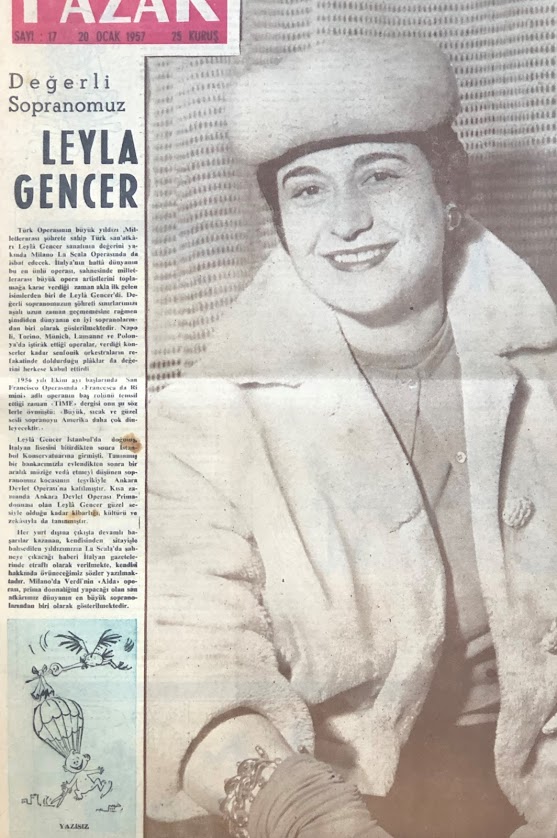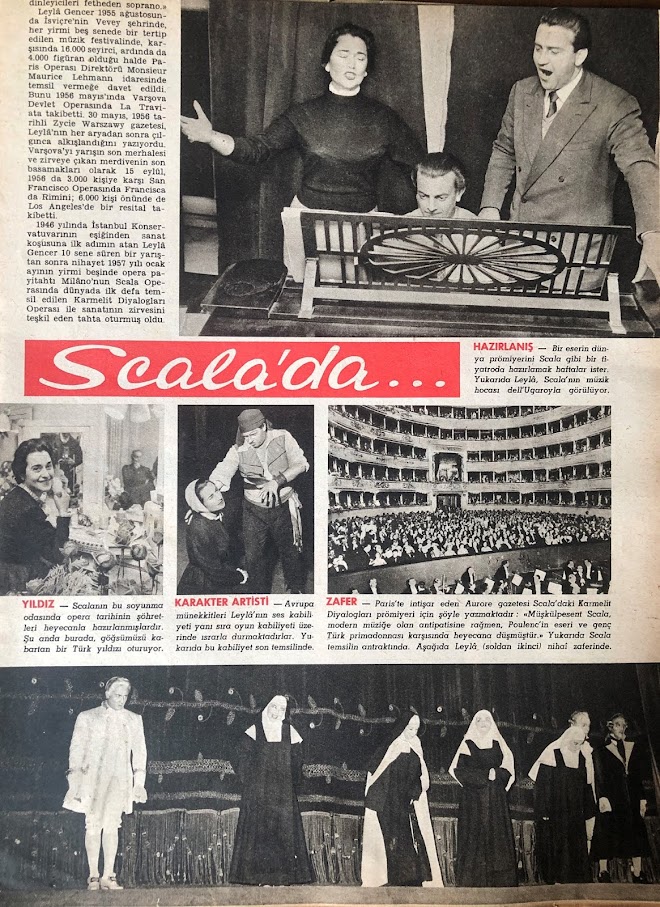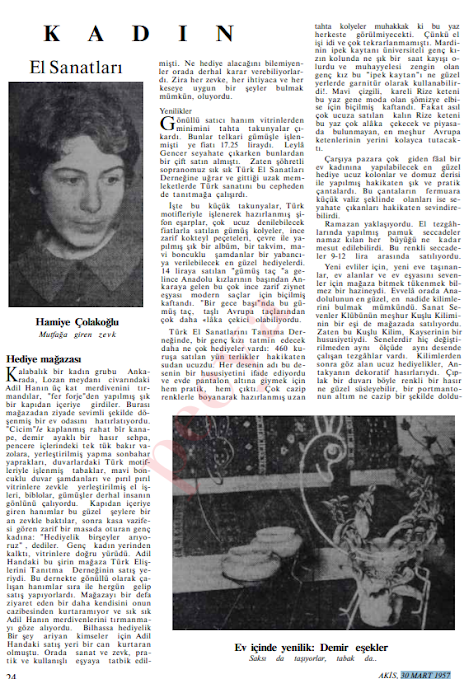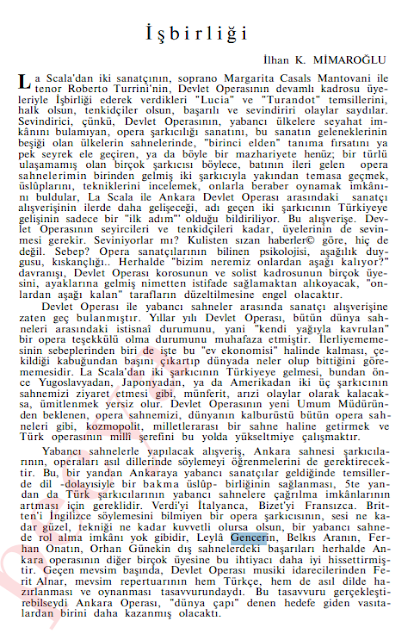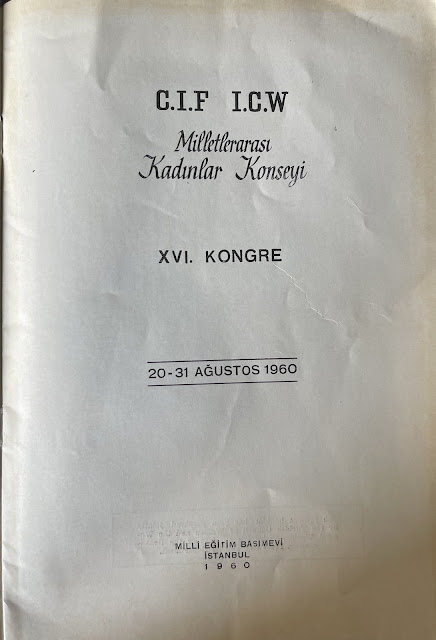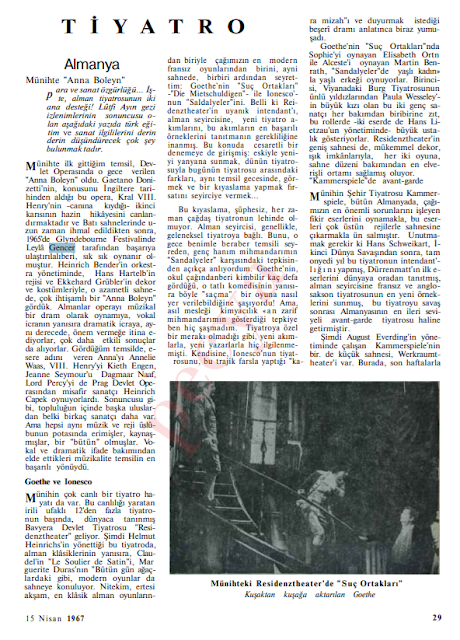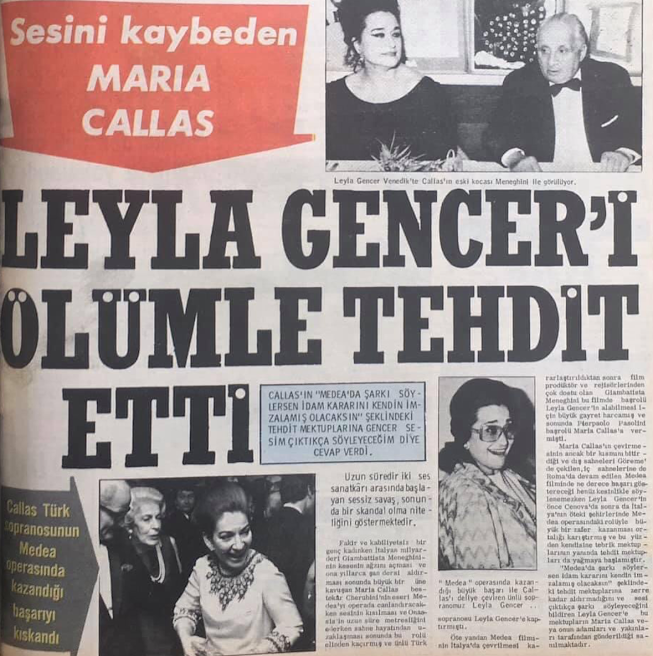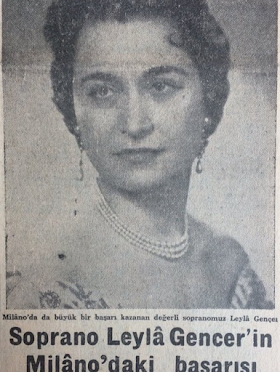
INTERVIEW
The special soprano of our opera: Leyla Gencer
The necessary elements in opera art, the Turkish people's perception of opera, the reason for her trip to Italy, the concept of degeneration, the necessity of an opera hour on the radio, and potential strategies to promote opera art.
In the year 1954, Leyla Gencer was 35 years old and was preparing to debut on the world stage. A few weeks before performing 'Madame Butterfly' at the San Carlo Opera in Italy, she mentioned Adnan Saygun's opera 'Kerem' and said, 'I liked it and I performed it with pleasure.' However, this would mark Gencer's first and last interaction with Turkish composers…
We were informed that Leyla Gencer, one of the most successful singers from the Ankara State Opera, was about to travel to Italy, and before that, she would give a concert to benefit at the Journalists Union. So, we visited her to gather information about the progress of opera in Turkey and her schedule abroad.
Born in 1923 (*) in Istanbul, after graduating from the Italian High School, Leyla Gencer studied at the Istanbul Municipal Conservatory and obtained her diploma in 1949 (**).
In 1950, she succeeded at the auditions and was admitted to Ankara State Opera, where she successfully carried out her duties for three years.
"Mrs. Leyla, could you please tell us what kind of qualities an opera artist must possess?”
“When we think about an opera artist, the first thing that comes to mind is the 'voice'. Alongside that, a talent for acting—meaning powerful acting skills—and a genuine musical culture are necessary.”
“How do you assess the current state of opera in Turkey, and what is the level of interest among Turkish audiences?”
“As is known, there isn't a long-standing opera tradition in our country. Nevertheless, it's evident that our opera has achieved significant success in a relatively short time, comparable even to operas in Europe. I believe that the current level of our opera is quite good. However, we need more artists to grow and continue the tradition after us. And when it comes to our people's perception of opera, it seems that there's an opera tradition in Ankara. The audience is showing significant interest there.”
Leyla Gencer's response indicates that opera enthusiasts, those who love and are interested in Western music, are compelled to be in Ankara and follow the programs of the Ankara State Opera to satisfy their interests. Since not everyone can afford to come to Ankara and attend these programs, individuals who enjoy Western music may have to suppress their desires, and those who wish to learn more and enhance their knowledge may not be able to fulfill their aspirations.
The Ankara Opera must tour.
“What steps should be taken to increase the popularity of opera in our country? Are radio broadcasts sufficient?”
“Completing the construction of the opera building in Istanbul is crucial to establish this. Organizing national and international tours for the Ankara State Opera is necessary. I don't believe that radio broadcasts alone would suffice.
We are confident that "The Hour for Opera Lovers" on the radio doesn’t benefit the people. Nonetheless, we must acknowledge and appreciate this initiative by the radio management. However, as our esteemed mayor and municipality administrators are aware, opera is not only an auditory experience but also a visual one. That's why it's essential to finish the construction of the unfinished opera building frame. That's how people's need for art will be fulfilled, and the city will gain a beautiful building.”
“It's often claimed that opera underwent a significant metamorphosis in the 20th century, leading to its degeneration. What is your opinion on this?”
“Labeling it as degeneration isn't accurate. Classical operas, the ones we've studied, are preserved in their original form. The new operas are dramatic works that have evolved to meet the demands of this century and are composed accordingly. Such operas are more vibrant.”
“When considering the current situation, how do you envision the future of opera art?”
I can't help but share the question posed by my colleague from the Cumhuriyet Newspaper during our conversation and Gencer's intriguing answer. Our colleague asked her how she found Adnan Saygun's opera 'Kerem and Aslı.
“I liked Kerem and Aslı and performed it with pleasure. When we hear an aria or a whole opera work and can immediately identify it as Italian, like Puccini, German like Mozart, or Russian like Tchaikovsky, we can say that 'Kerem ile Aslı' is Turkish Opera.”
Lastly, I asked Leyla Gencer about the details of her tour in Italy. Here were her words:
“I will be leaving for Italy on Friday. Between 1-21 February, I will be performing Puccini's Madam Butterfly and then, between 2-21 March I will be performing Tchaikovsky's Eugene Onegin at Napoli's San Carlo Theatre. Meanwhile, on February 15th, I will be performing in an orchestra-accompanied concert organized by the Italian Radio RAI in Rome. Additionally, I have finalized arrangements for another opera performance.”
(Gültekin Ovacık / 23 January / Radyonun Sesi / The archival work and the language adaptation to modern Turkish were carried out by Serhan Yedig)
(*) According to documents from the Italian High School, as shared in Evin İlyasoğlu's biographical book "Ben, Leyla Gencer," the artist was born in 1919. However, her identity card lists her birthday as 1923, and in the document provided by the Turkish Consulate of Milan, her birthday is marked as 1928. As a result, in most of the biographies found in international sources, her birthday is written as 1928.
(**) In the summer of 1949 in Istanbul, Gencer met the renowned opera star Giannina Arangi Lombardi, who was invited to Turkey to teach at the Ankara State Conservatory. She discontinued her studies at the Istanbul Municipal Conservatory, where she had been studying for three years, and moved to Ankara to receive private lessons from Lombardi. Gencer worked under the title of chorister at the Ankara Opera and did not attend the conservatory. Instead, she was trained by the Italian teachers who were working at the opera.
INTERVIEW BY LÜTFİ AY
“A Conversation with Leyla Gencer”
Leyla Gencer, the esteemed soprano of our theatre, has earned the honour of being the first Turkish artist to perform at La Scala, which is the largest and most prestigious theatre in Europe. She performed and achieved major success at the premiere of 'Dialogues des Carmélites' by the French composer Francis Poulenc, based on the work of Georges Bernanos.
After the performances of 'Dialogues des Carmélites', which garnered significant attention not only in Italy but also in all the music centres of the world as a world premiere, Leyla Gencer returned to Ankara last week. I found it necessary to interview her and hear about her reflections on this artistic experience, which seems to be the most important moment of her career. I visited her at her penthouse apartment located on Atatürk Avenue. As always, she answered my questions remarkably and with extreme gentleness. And I'm sharing her answers with our readers:
“How did you feel when you were stepping onto the stage of La Scala for the first time?”
“As you know, La Scala has been one of the largest, most prestigious, and simultaneously most selective theatres in the world for centuries. Their selectiveness is the reason why that establishment has gained worldwide fame and managed to maintain it. All major opera artists aspire to conquer this castle and perform on its stage; a task known to be exceedingly challenging. Moreover, it's known that numerous renowned artists have waited for many years to be accepted to La Scala, and despite multiple attempts, they weren't able to fulfil this desire So, it's a matter of immense pride for me to have been accepted into this temple of art in the seventh year of my artistic career, merely three years after starting to perform on international stages, and on my very first attempt. Of course, being accepted is just the beginning. It's essential to study the work assigned to me, to strive for excellence in every moment of the rehearsal period, to succeed at the premiere, and to earn the appreciation of the critics. It has happened that La Scala did not approve of the performances of several major opera artists with whom they had contracts during the last rehearsals, leading to the decision not to allow them to perform and having to pay them compensation. So, you can imagine how excited and ambitious I was during the intense month of rehearsal, preparing diligently in an atmosphere filled with anticipation, all in pursuit of success. I suppose you can relate better if I tell you that I lost 10 kilograms during the one-month rehearsal period.”
“Are you satisfied with the result?”
“I'm very satisfied with it, of course. I clearly suffered for a month, a hardship that many artists may not endure easily. However, God has rewarded me. As a Turkish artist in a sublime cast alongside the world's major opera artists, I believe I was able to bring pride and joy to my nation, its people, and our State Opera—a privilege I'm proud to be a part of. I've proven that a country with only a ten-year opera history and no established tradition can produce artists who can succeed on the Scala stage, given dedication and hard work. I can say this proudly, because the result obtained is equally or perhaps even more important and valued for my country than it is for me. So now the whole world knows that there's a Turkish opera in Ankara, and prima donnas of international calibre are raised there.”
“How did the performance go? What were the reactions from the audience and the critics?”
“Being a world premiere, the production was well-prepared. The technical preparations had started months prior, and the stage direction was entrusted to Viennese Margherita Wallmann, who had achieved major successes at La Scala and Salzburg. The scenery and costumes were ordered from the French set designer Georges Wakhevitch. "The orchestra was conducted by Maestro Nino Sanzogno, the permanent conductor of La Scala, who is an expert in modern operas. Additionally, to ensure the most perfect presentation of 'Dialogues' under sublime conditions, all financial resources were generously provided. All the artists from La Scala, including directors, choir members, orchestra musicians, and technicians, dedicated themselves to this production for one month. Approximately 400 people worked on this production, which is why the result was brilliant. Contrary to prior expectations, the audience loved the opera. Italian audiences are known for their intolerance toward new operas, especially foreign ones. The enthusiasm and appreciation shown by the audience, even at the first performance, brought joy to those who invested significant effort and money into staging Poulenc's work. Despite initially planning for four performances, a fifth performance was added to the schedule.
The most renowned figures in the opera and music industry were invited from all over the world for the premiere. Among them were opera directors, esteemed conductors, composers, writers, and critics. For instance, Mr. Adler, the director of the San Francisco Opera, where I had performed four months prior, travelled from the Pacific shores to Milan specifically for this event. Leading newspapers from Paris also sent their music critics. The enthusiastic approval shown by such an exclusive audience at the premiere was so significant that it could very well be termed a 'victory'.
And as for my role: I portrayed one of the Carmelite nuns; the Mother Superior. In the third act, the spotlight was mainly on me as I sang alone on stage. I had an aria that lasted approximately 20 minutes. When I finished singing, a big round of applause erupted and lasted for several minutes, even though the curtains had not yet closed. The applause that occurs before the closing of the curtain holds special significance for both the opera and the artist. It signifies that the applause isn't merely a courtesy or habit, but rather an authentic and sincere expression of appreciation. Following the performance, the Director of the Theatre, Conductor, Composer Poulenc, and the stage director visited my dressing room. They embraced and kissed me, expressing their contentment, especially the individuals who shape La Scala's future. Their satisfaction was so immense that they presented me with significant offers for the next season. As for the newspapers, the Italian critics were appreciative of my performance. I received positive reviews from La Notte, Corriere della Sera, and Il Tempo. While some French newspapers mentioned my name, others did not. However, this is to be expected in France, where national pride often prioritizes the success of the opera composed by a French composer over individual performers. That's why they chose to highlight this aspect of the performance to the public. Just as the Turkish public showed more interest in my success or failure than in the performances of Italian artists or the opera itself.”
“You sang Verdi's Requiem at Toscanini's funeral. How did that come about?”
“It might have been the most important event of my life, which I owe to Maestro de Sabata, one of the esteemed personalities of La Scala and the music world. He entrusted me with this duty due to his appreciation for my voice. When Toscanini's body was brought from America, I was about to return to Turkey. Given a duty of such importance, I postponed my return. We worked for two days with de Sabata. Even those days of rehearsals hold invaluable importance for me. So, as if it wasn't enough to portray the Mother Superior, I also sang Verdi's Requiem at the funeral held at Duomo Cathedral for the spirit of Toscanini. The fact that Italians didn't hesitate to include a Muslim girl's voice in the magnificent funeral held for Toscanini as part of national mourning showcases their grand artistic aspect, which doesn't discriminate based on religion or nationality and clearly it also fills me with great pride. My greatest aspiration was to one day sing under the baton of Toscanini. However, I was destined to sing the requiem at his funeral. This event will remain one of the most unforgettable memories of my artistic life.”
“Will you return to Italy?”
“Yes, I will be returning in about a week. There's the possibility of performing Puccini's 'Manon' at La Scala. I will also have a few performances in Palermo, which were assigned to me some time ago. Later, I'll have concerts at Radio and Television. I assume that regular performances at La Scala might be possible in the upcoming seasons. However, we'll plan our schedule accordingly. I will return from Italy in April. My biggest desire is to perform in Ankara and Istanbul before the season ends. I have missed our audience, who has always encouraged and appreciated me, and given me courage throughout my artistic journey. It would be my great pleasure to perform before them in Turkish.”
“I have fatigued you. Thank you for the interview.”
“Not at all. I thank you for taking the time to come and listen to me.”
Photo 1 (Page 14): Leyla Gencer portrayed Mother Superior 'Lidoine' in F. Poulenc’s opera 'Dialogues des Carmélites' during its world premiere at La Scala
Photo 2 (Page 16) Leyla Gencer was celebrated by Francis Poulenc, the composer of the opera 'Dialogues des Carmélites
Photo 3 (page 17) After the premiere of 'Dialogues des CarméAlites' at La Scala, we see (from left to right) the stage director Margherita Wallmann, set designer Georges Wakhevitch, Leyla Gencer, and other artists.
INTERVIEW BY LÜTFİ AY
“Leyla Gencer” Narrates
From La Scala to the Theatres of Vienna and Cologne
I once again visited Leyla Gencer at her charming penthouse apartment on Atatürk Avenue. She had recently returned to Ankara after a short vacation. It was an early evening when the hot Ankara sun had given way to a beautiful array of colours. This time we talked on a wide balcony. Her husband, İbrahim Gencer, who accompanied her during her last visits to Vienna and Germany, served us Coca-Colas with his own hands. It'd been months since we last saw each other.
“I've become accustomed to meeting you after your tour trips and listening to you talk about what happened and your reflections on your activities at the foreign theatres, and sharing them with our readers too... I think that closely following your successes and learning about the results interests your audiences, as well as the readers who haven't had the opportunity to see you onstage yet. So, if it's not too much trouble for you, could you please tell us briefly about what you've done after performances at La Scala? Where did you go, what operas did you perform, and how were you received?”
With her usual gentleness, Leyla begins speaking with a seriousness, knowing that what she has accomplished is both a success in art and is also an honourable national mission.
“As you know, I had been to Milan last May. I had a contract previously made with The Italian Radio and Television where I performed Verdi's Il Trovatore. The work for television is different from the opera performances. It takes weeks of preparation. It's demanding effort in every aspect... Considering that I performed with the most esteemed Italian artists, you would have an idea of how seriously and carefully one needs to work. Our tenor was renowned Del Monaco, our baritone was Bastianini and our mezzo soprano was Fedora Barbieri. The Italian Television had devoted all its financial and moral resources and the entire establishment to ensure that the performance was flawless. So, its advertisement was equally widespread. Once the work was completed, the performance was broadcasted live on television, not only in Italy but also in Germany, France, Switzerland, and Belgium, as they usually do.”
“What were the reactions to this performance of 'Il Trovatore' that you did for television?”
“Happily, the reactions were positive. The Italian newspapers give importance to performances for television equally as they do for the ones at the opera. Good reviews were written about me. A few days after the broadcasting of this performance in France, I received an offer from the Paris Opera to perform Il Trovatore a few times in the next season. However, I informed them that I wouldn't be able to give them a concrete answer unless my arrangements with La Scala for the next season were finalized.
The positive consequences of the TV performance also quickly manifested in Milan. At the time, some artistic events were being prepared for the celebration of Puccini's 100th birthday. And simultaneously, a new concert hall dedicated to the composer was about to be opened. Puccini's daughter, Madam Fosca Crespi, requested me to be present at this opening and sing a few arias, which I gladly accepted. I saw it as an honour to do my small part in commemorating this great composer, whose operas and music I have interpreted.
This new and very elegant concert hall was opened with a stunning ceremony, attended by people from Milan's high society and renowned names in the music industry. At that ceremony, I sang alongside Di Stefano, one of the most renowned tenors of Italy. After the concert, I was given a gold medal prepared for the occasion of Puccini's 100th birthday. I will preserve this medal, which was presented to only a few artists, as one of the most precious memories of my artistic career. Look, I'll show it to you…”
The gold medal Leyla took out of a tiny box was indeed a delicate work of art. Printed with elegant simplicity, the medal contained the name, year of birth, and the 100th year: Giacomo Puccini 1858-1958.
In the meantime, I noticed a tiny La Scala gold pendant hanging from Leyla's neck.
“Leyla, are you carrying La Scala around your neck now?”
“Ah, you're right. I almost forgot to tell you about it. It was gifted to me by my colleague Giuseppe di Stefano as a memory after our shooting of Il Trovatore for television. And this tiny La Scala holds a nice memory as well: Some evening after the broadcasting of the opera on television, we were having dinner at the renowned Baffi Restaurant, where opera artists meet almost every day, with Guiringelli-the general director, and Oldani-the artistic director of La Scala. And they wanted to see Di Stefano's gift. After seeing it, Guiringelli said, 'Alright, now Leyla will go back to Ankara and put this golden fetish around her ankle as so many women do and say: Here I've put La Scala on my feet! (J’ai La Scala à mes pieds!). And I promptly answered that we have a better saying in Turkish which we use for beloved ones or objects: It has a place over my head. I won't put this tiny La Scala around my ankle, but I'll wear it around my neck and carry it as a fortunate charm. They certainly liked my answer, which filled them with a sense of earned pride.”
“And how did the arrangement with the Vienna Opera come about?
“Right after the performances on television, La Scala, which had arranged a formal tour with the Vienna Opera, engaged me for two performances of La Traviata. The performances in Vienna were to be held by the soloists of La Scala; the choir, conductor. And even the artists for minor roles would be arranged by the Vienna Opera. La Scala had given performances of Aida, Manon, and Carmen in Vienna, and it would be my debut of La Traviata with the La Scala ensemble. Moreover, at the Vienna Opera, which is known to be one of the biggest and most renowned theatres in Europe after La Scala. And as if that wasn't enough, the conductor was Herbert von Karajan, one of the most renowned conductors in the world. For me, the most challenging aspect of those performances was that on international opera stages like those, operas were almost always performed without rehearsal. With the ensemble, I went on stage to sing La Traviata without having rehearsed. You can imagine the level of my fear and excitement when I stepped onto the stage. Von Karajan seemed rather irritable to me. Before the opening of the curtain, he came to the stage, only saw my costume and make-up, said, 'Fine!' and left. Neither did I know his tempos nor attacks, nor was he aware of my interpretational skills.
In the first act, as I stepped onto the stage, there was a very short moment of hesitation. But after the very first measures, it seemed like a sudden agreement, and connection was established. Von Karajan is a master accompanist. It was as if he was following me in each word and phrase. Even more, after the second act, I was able to sing without needing to look at his baton.”
“I guess the Austrian President attended your performances at the Vienna Opera and highly appreciated you.”
Yes, he honoured our second performance. It was kind of him to send his words of congratulations through our ambassador. Also, our ambassador, who honoured me by following my every step at the Viennese performances, was greatly pleased by the interest and enthusiasm shown by the audience. After the performances, there were too many Viennese people racing with each other in order to have programs and photographs signed by me, and as this process prolonged, I felt bad for keeping him waiting. At that moment, he shared these sincere words which made me very happy: ‘Mrs. Leyla, I would gladly wait for you, even if it took two hours. We conquered Vienna today!’
“Where did you go after the performances in Vienna?”
“After Vienna, we went back to Milan towards the end of June. My intention was to go to Naples with İbrahim, where I would perform Tosca a few times upon the proposal of San Carlo, and also to have a period of rest, which I was seriously in need of. But things didn't go according to plan.
The administration of La Scala, very content with the success I achieved in Vienna, asked me to join their official tour to Cologne, Germany. There, they would bring the whole company to perform at the recently opened opera building. The role they offered me was the protagonist of Verdi's La Forza del Destino. That's why I wasn't able to accept the proposal of the San Carlo Theatre of Naples. In the meantime, an unpleasant event also occurred. The intendant of the San Carlo Theatre had already announced my participation in Tosca without receiving a definite answer from me. However, I couldn't refuse La Scala's proposal, which was vastly important for my career. I couldn't go to Naples. Their taking me to Cologne right after the performances in Vienna was proof that I had found a place in the steady cast of La Scala, which I didn't have the right to ruin.”
“When and how did the performances in Cologne take place?”
“La Scala Theatre travelled to Germany as a complete company, including its choir, orchestra, directors, conductors, scenery, and costumes. This entire group of people and their equipment, which occupied a large space, travelled in special vehicles. La Scala made us a very gratifying gesture by including İbrahim in the group. Having him beside me during these travels and performances gave me great power and courage.
La Scala performed La Sonnambula and La Forza del Destino in the first weeks of July at the new theatre. Maria Callas portrayed La Sonnambula, while I performed in the latter. Therefore, La Scala had taken me on the Cologne tour as one of its major sopranos, alongside Maria Callas.”
“How did the performances in Cologne go?”
“La Scala achieved a greater success than expected. Because Germans generally are accustomed to a different kind of opera style and perception. However, they were enchanted by the magnificence realized by the voices, choir, orchestra, scenery, and direction of La Scala's performances. And about me, it was my first time singing and acting in Verdi's La Forza del Destino. I prepared the entire opera in just 10 days. You can imagine how challenging that was. Just a minor mistake or setback could have tarnished my artistic prestige at La Scala. However, by working night and day, happily, I succeeded. There were reviews praising my success not only in the newspapers of Cologne but also in the major newspapers of Germany. After those performances, La Scala officially informed me not to engage with any other company without their confirmation.”
“Yes, but aren't you going to America again soon?”
“Yes, but it's only to fulfil an arrangement made last year. Within 5-10 days, I'll be leaving from San Francisco for the second time. The San Francisco Opera season has gained the same importance as the Metropolitan Opera in America. I'll be performing La Traviata and Turandot (Liu) there, which I'll then repeat in Los Angeles.”
“It was rumoured that you were about to embark on a long concert tour in America.”
“Yes, but there are some roles that I'm expected to be assigned by La Scala in the upcoming season, which abstains me from accepting that weeks-long tour for now. However, it would always be possible for me to realize it in the future.”
“When will you be returning from America, and do you have another engagement planned for later?”
“My contract with the San Francisco Opera terminates on November 15th. On that date, I'll board a plane in Los Angeles and return to Italy on November 15th. According to an agreement we recently made, I will give four performances of Il Trovatore at the Verdi Theatre in Trieste, which will be conducted by La Scala's Maestro Antonino Votto. With this opera, the Verdi Theatre will inaugurate its opera season of 1957-1958. Following right after, I'll go to Venice and perform another opera by Verdi, I due Foscari, under the baton of Maestro Tullio Serafin at the new season opening of the renowned and historical Fenice Theatre in the first days of December.”
“When will we be able to see you perform again at Ankara Opera?”
“Always, I'm connected to my stage, which has nurtured me and provided the best conditions for my international endeavours with great understanding. Whenever Mr. Muhsin wishes and calls me, it would be a major pleasure to come and perform and sing alongside my friends, no matter where I am in the world.”
As I was leaving her house after thanking her for all the answers she gave and all the lovely anecdotes she was kind enough to share, she was getting ready to start her rehearsal with her personal correpetitor. Together, they would begin preparing for the performances of Turandot that she'd be performing at the shores of the Pacific.
Photo 1: (Page 31) Leyla Gencer in La Traviata opera
Photo 2: (Page 34) Leyla Gencer, receives her passport alongside her husband, before leaving for America

1 9 5 8
Leyla
Gencer Narrates
Following her recent successful achievements in America and Italy, Leyla Gencer, the esteemed artist of our opera, has begun to shine as a star. She is now recognized as one of the major celebrities in the opera world and is being compared to Maria Callas.
Risky
Days
“How did you accomplish that mission within 10 days?”
Lucia’s victory
“How did the first performance go?”
From the Pacific Shores to the Adriatic Shores
“After returning from America, which operas did you perform in Italy?”
“Will you stay in Ankara for long?”
1 9 5 9
INTERVIEW
A Conversation with Gencer
Conversations With Artists
Leyla Gencer Narrates
Leyla is very sweet, gentle, and kind in her personal life as well. At the point when I had lost hope of meeting her, I ran into her at a doctor's clinic. She was able to arrive one and a half hours after our scheduled meeting time. Just like every woman, we first sat down and had coffee, read our coffee fortunes, talked about fashion and inflation, ate, drank coffee again, and completed our conversation. Meanwhile, Leyla was called numerous times, and journalists came and took pictures.
Yet, I am still not convinced that we give her the attention she deserves.
Here’s a summary of our conversation:
“How can we expand polyphonic music education in our country?”
“There should be music lessons at every school, a conservatory in each city, and teachers and professors should be well-prepared. There should be frequent tours throughout the country to perform concerts. To achieve this, ancient open-air theatres can be used to perform opera and other types of classical concerts. Music shouldn't belong to just two cities; it should be brought to the people.”
“How did you find this year's open-air concerts conducted by Hikmet Şimşek?”
“It's an on-point and necessary initiative. I wish that this activity, which is worthy of congratulations, should be repeated often. But I believe that along with the orchestra, soloists should also participate.”
“What is your opinion on the orchestra's conductor?”
“Opera conducting is a specialized field. For example, in Italy, prominent opera conductors of today once worked as corepetitors or prompters and had the opportunity to collaborate with major esteemed conductors, so they learned all the opera traditions. That's how major conductors such as Tullio Serafin, Santini, and Votto were trained.”
“Can't a summer festival be organized in Turkey?”
“It can be organized. It would be just right to organize an international music festival. It would be an important event both for promoting our artists and also for getting to know international artists.”
“What are your thoughts about the situation and the conditions of our composers?”
“We have quite prominent composers, primarily Adnan Saygun, Nüvit Kodallı, Ferit Anlar, Ulvi Cemal, and Cemal Reşit Rey. Our government has provided them with major opportunities and sent them for education in Europe. However, they shouldn't only be appointed as teachers at conservatories when they should be composing; instead, they should be offered better conditions to write music comfortably. The government should work on promoting them in Europe, getting their works performed, and having their musical scores printed.”
“Can Turkish folklore be an inspiration for modern Turkish opera?”
“Yes, it can.”
“What are your thoughts on the condition of the conservatories compared with 10 years ago versus now?”
“The conditions were much better ten years ago.”
“What can be done for our artists to learn foreign languages?”
“It's essential for artists to learn foreign languages. The language lessons at the conservatories should be more rigorous, and artists should pay more attention to learning them.”
“Can an artist balance their personal life with their artistic life?”
“It might be a bit challenging, but it can be done. During busy periods, especially at the beginning of the theatre season, private life becomes of secondary importance.”
“Should a world-renowned artist choose their art or their family?”
“They should choose their art.”
“Could you inform us about your Europe schedule this year?”
“I’m engaged until 1961.”
“Where will you go?”
“From November 20th until February 16th, I'll be singing Prokofiev's The Fiery Angel at theatres in Trieste, Venice, Palermo, and Rome. I’ll also sing Verdi's La Battaglia di Legnano, which I previously performed at the Florence Festival, for the season opening in Venice. Additionally, I'll perform Verdi's Macbeth and Mozart's Don Giovanni. After performances on Italian television, I'll go to India. Upon my return from India, I'll perform again in Rome, Milan, Spain, Austria, England, and possibly Russia. Then I’ll have a holiday, and in September I'll go to the USA.”
“Could you also tell us about your schedule and activities from last year?”
“In the last 1.5 years, I have learned and performed exactly 15 operas, all of which were quite demanding. These include Verdi's Due Foscari (Lucrezia), Rigoletto (Gilda), Don Carlo (Elisabetta), Simon Boccanegra (Amelia)Lida), La Battaglia di Legnano (Lida), Boito's Mefistofele (Margherita), Puccini's Turandot (Liu), Il Tabarro (La femme), Suor Angelica, Manon Lescaut, Donizetti's Anna Bolena, Lucia di Lammermoor, Bellini's La Sonnambula, Pizzetti's Asssasinio della Cattedrale and Prokofiev's Fiery Angel.”
“Along with these additions, how many operas are there now in your repertory?”
“38.”
“Could you share some excerpts from recent reviews about you?”
“I can share the latest review about me, which was printed in Italy. M. Eugenid-Gara, who wrote about the Florence Festival in L'Europa Magazine's May edition, described me as one of the best Verdi sopranos of our time, adding: Unfortunately, she's not Italian, but Turkish.”
Photo: Leyla Gencer in the opera La Battaglia di Legnano
INTERVIEW
Our esteemed soprano will occasionally perform at the new opera house opening in Istanbul
Leyla Gencer, who will perform for the benefit of the "Friends of Children Foundation" after her three concerts in Ankara, held a press conference yesterday at 5 pm.
The esteemed soprano, whose contract has been cancelled due to her absence from performances on the State Opera stage for the last three years, has declared that both parties are right in their perspectives. Gencer, who will not be performing at the State Opera from now on and has denied the harsh gossips, said: 'The State Opera is nobody's property. The theatre continues, but the directors change.’
Leyla Gencer believes that performing at international theatres would be more beneficial for promoting the Turkish artistic life than performing continuously at the State Opera season.
Gencer said: 'My explorative endeavors in foreign countries can't go on for many years. I can't do anything but accept these important offers in these years, which I'm living the most fruitful time of my career.’
Soprano Leyla Gencer has engagements to perform in various opera productions across Europe, America, and India.
Leyla Gencer
(Continuing from Page 1)
Gencer, who claims to be ready to do whatever it takes to promote classical music in Turkey, has promised to participate in the Anatolian tour that is going to be undertaken by the Presidential Philharmonic Orchestra.
Regarding this subject, Gencer said, "Just as I sing at La Scala, I would sing with the same excitement in any city of Anatolia.
During her talk, the soprano also mentioned the Istanbul Opera, saying, "There are many differences between something that doesn't exist and something that exists on a minor scale. In my opinion, it's a huge deficiency and mistake not to have founded an opera house in Istanbul.
Gencer, who seems determined to perform occasionally at the opera house planned to be opened in Istanbul, has also declared that, although it's not clear yet, a date for the opening has been set.
1 9 6 2



1 9 6 5
1 9 6 9
1 9 7 0




